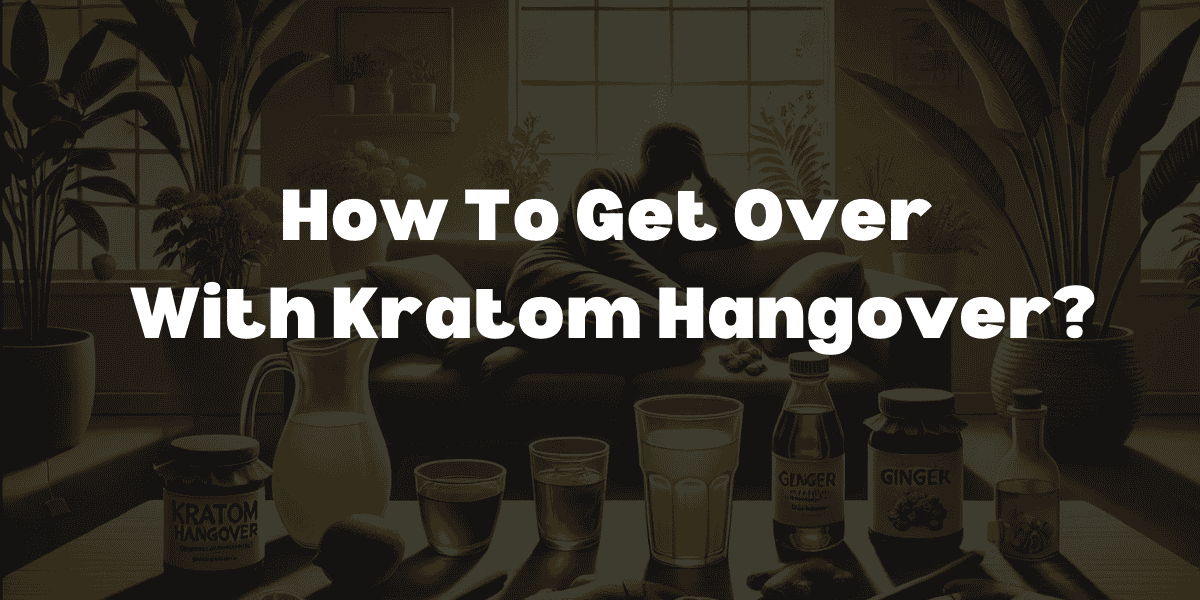
Kratom, derived from the leaves of the Mitragyna speciosa tree, has gained popularity for its potential benefits, including pain relief, mood enhancement, and increased energy. However, like many substances, it can lead to undesirable effects when used excessively or improperly. One such effect is a kratom hangover, which can leave users feeling fatigued, groggy, and unwell.
This blog post will explore the symptoms of a kratom hangover, how long it lasts, and effective tips for recovery.
Hangover or Withdrawal?
Hangovers are the immediate aftereffects of overindulging, while withdrawal symptoms occur when your body craves a substance it has grown dependent on. Withdrawal can include some of the symptoms of a hangover like nausea and vomiting.
Withdrawal symptoms are the body’s way of responding to the prolonged overuse of a substance. Hangovers are the acute effects of taking too much of a substance on a singular occasion. Withdrawal symptoms are far more serious and indicative of a potential substance use disorder.
Overdoing it with various recreational substances, including excessive kratom use, can often result in unpleasant hangovers.
What might cause a kratom hangover?
There isn’t much research on whether kratom can cause a hangover, so we have to rely on what users have shared from their experiences. The factors that trigger or worsen the undesirable effects are said to be similar to excessive alcohol consumption, for instance:
- Dehydration
- A lack of sleep
- Pre-existing gastrointestinal tract irritation
- Having a headache
- Consuming on an empty stomach
Kratom hangovers are often linked to specific factors unique to the herb, such as:
- Drinking alcohol at the same time as using kratom
- Using high doses of sedative strains
- Mixing two sedative strains (e.g. red Thai kratom and red Maeng da kratom)
- Using kratom regularly without rotating strains
- Poor quality kratom
- Contaminated kratom
Symptoms of kratom hangover
Kratom hangovers are fairly common and feel surprisingly similar to the classic hangovers many of us are all too familiar with. Symptoms of a kratom hangover include:
- Headache
- Nausea
- Dry mouth
- Fatigue
- Aches and pains
- Loss of appetite
- Mood swings
- Diarrhea
- Anxiety
Headaches are a common feature of both kratom and alcohol hangovers, though the dilation of blood vessels often causes alcohol-induced ones. Scientists are still trying to find the cause of kratom headaches. They can’t yet connect the plant to the hangover at all.
Though they share some similarities, key differences set these morning-after options apart. Alcohol hangovers present decreased cognitive function, increased heart rate, and trouble focusing, unlike kratom.
Some of the symptoms are simply side effects of using kratom. Gastrointestinal issues like constipation are well-documented with this herbal elixir. Others report dry mouth, fatigue, and loss of appetite, but reactions vary depending on which strain you consume.
How long does a kratom hangover last?
A kratom hangover can feel a bit like an alcohol hangover, with effects that typically last for up to 24 hours. While they’re not overly intense, they can be mildly uncomfortable and more of an annoyance than anything else. The severity and duration depend on the quantity and quality of kratom you consume.
Hangovers are often a sign of dehydration, so simply drinking water can help you feel better. It ferries toxins to the exits to reduce adverse effects. Eating protein-rich foods, relaxing with TV or music, and exercising can also reduce recovery time.
Time is the only real cure for it, which is why some folks prefer to sleep through it and let the hours heal. The body takes time to metabolize the plant, processing it before eventual excretion.
To steer clear of hangovers, it’s best to stick to moderate, consistent doses. Also, make sure you’re getting your products from a reliable source to avoid low-quality leaves.
If you often wake up with a hangover and struggle to get through the next day, it might be time to rethink how much you’re drinking. Don’t mix kratom with alcohol, as it boosts the chances of a hangover. Never incorporate the botanical with other intoxicants, as it can lead to serious side effects.
Understanding the difference between a kratom hangover and withdrawal

The key difference between a hangover and withdrawal is really about when you last had your dose. Hangovers happen the morning after, while withdrawal symptoms arise when users develop dependence.
V Withdrawal is much more dangerous as it indicates a severe physical reaction to potential substance abuse.
Both withdrawal and a hangover can bring on uncomfortable symptoms, like nausea or vomiting. Everyone knows about the potential for alcohol hangovers, but many different recreational substances, including kratom, can lead to similar effects.
Keeping a diary is a smart way to track your usage and pinpoint what might be causing those unwanted effects. It can be an invaluable source of information when tailoring your kratom routine to suit what you need and want from the herb.
A kratom hangover, also known as kratom sickness, occurs when you take more of the herb than your body can handle. Similarly, if you’ve been using kratom for a while and suddenly stop, you might experience withdrawal symptoms. Any withdrawal signs could mean you need to revisit your kratom regime, whereas a hangover will disappear with time.
Just like how a hangover can affect people differently after drinking too much, not everyone will have the same symptoms. Some may not get any adverse effects at all. It’s important to remember that external factors also play a significant part, especially when considering how to avoid a kratom hangover.
Some withdrawal symptoms can feel a lot like the ones you experience during a kratom hangover. But if you don’t stick to your kratom routine, these effects might stick around longer than you’d like.
To spot symptoms of withdrawal look for these physical signs:
- Trouble sleeping
- Muscle aches and pains
- Running nose and eyes
- Abdominal cramps
- Nausea
- Diarrhea
- Dilated pupils and blurry vision
- Sweating and hot flashes
- Fever
- Loss of appetite
You may also experience changes in your mood and well-being. For example, you may feel:
- Irritable
- Anxious
- Fatigued
How to Recover from a Kratom Hangover?
To get back on your feet when you’re experiencing a kratom hangover, there are a few tips and tricks that can prove helpful.
1. Hydrate
Dehydration plays a big role in how bad a hangover can hit. It acts as a diuretic, making your kidneys hold onto more fluids, which leads to more frequent trips to the bathroom and increased water loss. Overindulging in one’s kratom dose can lead to symptoms like headaches, dry mouth, and gastrointestinal issues.
2. Sleep and relaxation
Just like recovering from a hangover, getting some rest can help your body heal faster. While you sleep, your liver works to break down and clear the mitragynine from your system. Not only that but getting some shuteye will help the time pass without you feeling all of the effects of that hangover.
If you’re struggling to fall asleep, simply resting can still work wonders to help you recover from a kratom hangover. For an added dose of relief, try relaxing with a cold compress on your forehead – the cold will hinder the brain’s neurotransmission of pain and constrict the blood vessels in that area.
3. Exercise
After a kratom hangover, hitting the gym might be the last thing on your mind. But even light activities, like doing some chores around the house, can boost your mood with those feel-good endorphins. It will, in turn, give you a burst of energy to help push past the groggy, tired feeling.
4. Eat
When you’re feeling nauseous, the thought of eating might be the last thing you want. But, reaching for high-protein foods can help ease those kratom hangover symptoms and get you feeling better faster.
Whip up a hearty plate with boiled eggs, chicken stuffed with cottage cheese, and some fresh broccoli for a meal that’ll help you shake off that hangover. Alternatively, you could opt for a bowl of Greek yogurt, oats, and almonds for a sweeter treat.
How to avoid a kratom hangover?
Just like with alcohol, it’s important to use kratom responsibly and be mindful of any factors that could cause unwanted side effects. Below we explore ways to achieve this as we share advice on how to avoid a kratom hangover from the get-go.
1. Drinking a lot of water
If you haven’t realized it yet, staying hydrated is the secret to making your experience with the herb much more enjoyable. Staying hydrated will reduce the severity of numerous side effects linked to a kratom hangover. A healthy water intake before using the herb can even stop symptoms from setting in.
2. Don’t mix alcohol with Kratom
Mixing kratom with alcohol is a quick way to set yourself up for a hangover. It may be tempting to create a kratom hot toddy, but the combo can lead to various undesirable effects.
3. Watch the amount of kratom you use
Establishing a consistent kratom routine can significantly lower the risk of unpleasant side effects, like a kratom hangover. Straying away from the regime by using more of the herb than usual or adding an extra kratom day into the week is sure to shock your body at first.
To keep things balanced and responsible, it’s best to avoid using the herb more than once a day. If you do opt for multiple dosages, make sure there’s a six to eight-hour gap between, or you’re sure to end up with a kratom hangover.
4. Maintain a healthy diet
Eating regular, balanced meals is not only great for your overall health but can also help prevent many of the uncomfortable effects that come with a kratom hangover. Before you use the herb, a hearty meal will help slow down its absorption, making for a more balanced and positive experience.
Final Thoughts
Kratom hangovers serve as a strong reminder that even natural or herbal supplements should be used in moderation. If you’re dealing with one, just know you’re not alone—many have been there too. To get over it, focus on drinking plenty of water, resting, and taking good care of yourself. To avoid future hangovers, use Kratom responsibly and learn about its different strains.
Remember, kratom hangovers usually happen when you overdo it. Knowing your limits is key to enjoying all the benefits of kratom without feeling regret the next day.
More Readings For You:



Leave a Reply